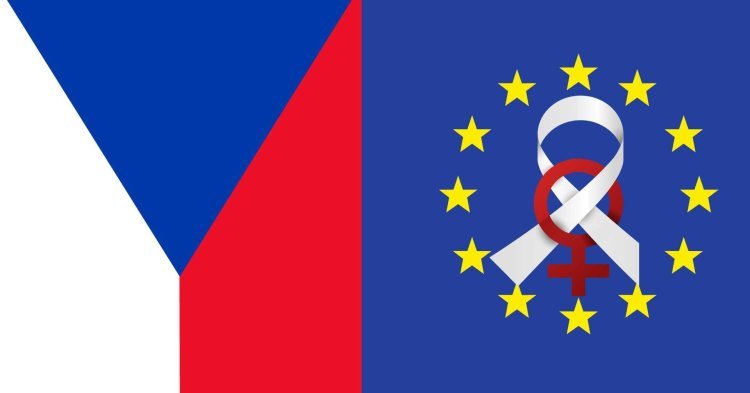In the last week of January, Slovak police officers in Bratislava, Slovakia intervened in a robbery of a gas station. Upon their arrival, they discovered that a Czech woman, who was violently pressured into opening the safe, tried to stop the intoxicated robber by giving him oral sex. This presumably traumatising case of sexual assault was then shared by various different media outlets and social media users, laughing at the woman’s unconventional ‘act of bravery’ which, in some minds, only reaffirmed the stereotype of Czech women being ‘easy’. Why, only three years after the #MeToo movement began, is sexual assault against women still a laughing matter for some Czechs?
The country’s attitude to gender-based or sexual violence can be outlined in numbers. Eurobarometer’s 2016 report on gender-based violence documents that almost a quarter (24%) of Czech respondents saw forced sex with a partner as something that shouldn’t be against the law. When it comes to rape, some Czechs (17%) considered it justified in some cases, such as when the person doesn’t fight back or if they were flirting beforehand. 57% of Czech respondents also thought that women are more likely to be raped by a stranger, when actually, the World Health Organisation (WHO) states that in all countries the perpetrator is more likely to be someone the victim knows.
These attitudes are also mirrored in Czech law. The legal definition of rape in the country defines the act as coercion to sex “by violence or threat of violence or threat of other serious harm” and “[the abuse of] his/her inability to defend him/herself for such purpose”. In a time when many European countries are moving to a definition of rape based on the lack or withdrawal of consent, the Czech definition, based on the assumption of force or violence, is quickly becoming outdated.
Public debate and #MeToo
The legal definition of rape and these attitudes make more sense once we consider the public debate surrounding this topic. Rape and gender-based violence is often played for laughs to the Czech public, while being derogatory to the experience of the victims. This is true of the Czech president Miloš Zeman, known for his controversial and divisive witticisms. In 2017, Zeman addressed the parliament regarding several female activists who protested logging and chained themselves to trees. The president’s advice to the loggers? To “saw through” the activists (Czech: přeříznout; English equivalent: bone them). Other remarks include his jokes about having sex with Claudia Schiffer in hell or presenting rape as “an evolutionary advantage”.
This attitudes of some towards rape and gender-based violence survived even the global #MeToo movement. Again, the experience of the few women who shared it (including the European Commission’s Věra Jourová) were downplayed and ridiculed. The remarks about #MeToo by the late Senate chair Jaroslav Kubera perfectly sum up what the debate about the movement was like: “I test Czech women and girls and have to state with pleasure that they are untouched by the #MeToo movement. They hold, they like it. I always start with gently stroking them and then I ask if, by any chance, they’re not like those stupid Americans. And they’re not.”
No Western ideas allowed here
Finding an explanation for these trends in the Czech Republic is difficult. Some link it to social conditioning and the country’s communist history, which by granting women rights prevented the feminist movement from appearing, and therefore considered the issue of women’s rights solved. Another explanation could be disillusion with capitalism and democracy after the fall of the USSR, which we’re currently seeing in Europe, especially in the V4 bloc (Czechia, Hungary, Poland and Slovakia). The US and the West are now seen not as allies, but rather as countries in both political and moral decay. Thus, their ideas about what constitutes consent, sexual harassment and ‘all these genders’ are considered by some as dangerous and of no interest to the Czech Republic.
Such a sentiment is voiced by many in the country, including several people whose authority has the potential to change the country’s attitude to gender-based violence. One of them is a prominent Czech sexologist Radim Uzel. Known for his Arginmax (medication for erectile dysfunction) commercials, Mr. Uzel is also an important figure in Czech sex education. He has been touring the country for years, using ‘funny’ anecdotes from his work to teach young generations about sex, as well as writing multiple books on gender roles. However, instead of using his popularity to refute myths surrounding sex and rape, he doubles down on them. Thus, generations of Czech pupils walk out of his talks, having learned that rape is the victim’s fault or that it is normal to touch a co-worker in a sexual way. For Mr. Uzel, the idea of consensual sex or zero-tolerance of sexual harassment in the workplace are, in his eyes, inventions of those bad Western (and especially American) ultra-feminists. And we don’t want that in the Czech Republic.
What does the future hold?
Ironically, it’s Mr. Uzel who might help bring about change in this situation. In the last few months, his work and impact on how Czechs view sex and sexual assault has been analysed by journalist and film critic Kamil Fila. The 10-article series has gained a lot of attention on social media and prompted Mr. Uzel to appear in an online interview, leading to a number of sexologists denouncing his claims.
Positive change might also be propelled by projects, such as Konsent, which aims to educate about sex and consent. Together with Amnesty International, the organisation is currently leading a campaign to change the legal definition of rape to focus on the lack of consent. Public debate on the issue also has the potential to change. Female journalists, such as Silvie Lauder, continue to be vocal about #MeToo and violence against women. A female lawyer Lucie Hrdá has gained popularity on Twitter, where she points out the inadequacies in the legal framework around rape and assault, and refutes myths.
There is clearly a lot of work to be done before we will see substantial changes. This work must be done not only by journalists and NGOs, but also politicians. A good step forward in this direction would be the proposed change of the definition of rape, or the ratification and implementation of the Istanbul Convention, aimed at preventing and tackling violence against women, which the country signed in 2016. If Czech politicians and public figures decisively condemn gender-based violence and sexual assault, maybe, with time, there will be less laughter the next time we hear about a scared woman giving oral sex to a man who just threatened her life.


Follow the comments: |
|
